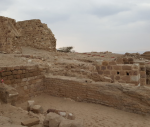You are here
Strategy might work
Oct 07,2014 - Last updated at Oct 07,2014
It has been more than two weeks since Palestinian President Mahmoud Abbas delivered what became known as his strongest speech from the UN’s General Assembly podium.
This time, the 75-year-old leader did not offer compromises or speak hopefully about the two-state solution. He condemned “Israeli genocide” in Gaza and vowed that the Palestinian people will not “forget and will not forgive, and will not allow war criminals to escape punishment”.
He talked about Israel’s “colonialist occupation and racism” against the Palestinians.
And his message to the West and to Israel was clear: The Palestinians will not be resuming futile negotiations while Israel continues to ignore commitments, and builds and expands illegal settlements in East Jerusalem and the West Bank.
For negotiations to start, they must have the final objective of ending the occupation and establishing an independent Palestinian state along the 1967 borders, according to a firm deadline.
It is evident that Abbas has given up on decades of US-sponsored peace talks that keep failing to deliver the most basic Palestinian demands.
Coming from the man who engineered the Oslo talks more than two decades ago, which led to the signing of the historic Washington Accords in 1993, the speech underlined a major shift in Abbas’ outlook and strategy.
He called on the Security Council to back up a resolution that sets a deadline for Israeli withdrawal — within three years, according to Palestinian officials.
As expected, the speech was criticised by the US, which described it as “deeply disappointing” and “offensive”, and condemned by Israel.
The reaction elsewhere was muted. Unfortunately, while Abbas delivered his game-changing speech, the world was focused on another crisis: the growing danger of the so-called Islamic State to Iraq and Syria.
This is disappointing, to say the least.
The change in strategy by the Palestinian president comes at a time when hope for a two-state solution in Palestine is quickly fading.
Israeli Prime Minister Benjamin Netanyahu provided no way out and attacked Abbas, while comparing the Islamist resistance movement Hamas in Gaza to IS.
If the Palestinians go ahead and submit a draft resolution to the Security Council, it will put Abbas and his fumbling authority on a new path altogether, regardless of the outcome of the vote.
The US will surely veto the resolution — it is trying to submit one on Gaza with Arab allies — but it will be interesting to see how many countries support it.
The 51-day-war on Gaza, which left more than 2,000 dead, mostly children and women, triggered a new global campaign of sympathy with the Palestinians. And despite inter-Palestinian rift, it handed Abbas, who remains critical of Hamas, some important bargaining chips.
The question now is this: Has Abbas embarked on a one-way journey to challenge and end Israel’s occupation?
Certainly his new approach, after the UN speech, has brought him closer to his people who also believe that negotiations with Israel brought them nothing.
And if the answer is yes, then what can we expect next from the Palestinian leadership?
Abbas’ options are limited, but they are important.
Failing to get the resolution approved by the Security Council, close associate say that he will be ready to sign a number of international treaties that will add diplomatic and political pressure on Israel.
The most controversial of these treaties will allow the state of Palestine to join the International Criminal Court, a move that will make it possible to look into alleged Israeli war crimes in Gaza and if there is enough evidence, issue warrants against top Israeli officials.
But even this will not change the Israeli mindset and may even radicalise the public even further.
Abbas is under attack in Israel, with a growing number of people dismissing him as a peace partner.
Another bargaining chip is the security coordination between Israel and the Palestinian Authority (PA), which Abbas had defended even when Gaza was under fire.
But with Israeli forces in control of most of the West Bank, it is unlikely that terminating joint security coordination will hurt Israel much. Such steps will almost certainly push Netanyahu and his right-wing partners to accelerate unilateral moves to annex major chunks of the West Bank.
Abbas would then have one penultimate move to make; dissolve the PA and declare the West Bank occupied territory, handing over all responsibilities to the Israeli occupying force.
This is a major step to take and will create problems for both Israel and thousands of Palestinians who depend on the PA for their livelihood.
One thing Abbas can count on will be growing international backing for his plea to set up a deadline to end Israeli occupation.
The majority of nations, including Arab states, back a two-state solution, and while most have little direct pressure to bear on Israel, recognising the nascent state of Palestine would be one way to ensure the viability of such approach.
Already Abbas can claim some reward in Sweden’s recent announcement that it will recognise the state of Palestine. Other Scandinavian countries might follow suit.
Other moves will take the shape of backing the BDS campaign (boycott, divestment and sanctions) against Israel, which is picking up pace in many European countries.
But the biggest initiative Abbas can take, if all fails, is to totally abandon the bid for statehood and wage a campaign to win civil and political rights in historic Palestine.
As dangerous and somewhat difficult to achieve, such move will rattle and confound Israel whose extremist leaders are seeking recognition of their country as a Jewish state.
But it all depends on Abbas, who has backed down from face-offs before. His UN speech shows that he is now willing to go all the way.
The writer is a journalist and political commentator based in Amman.













